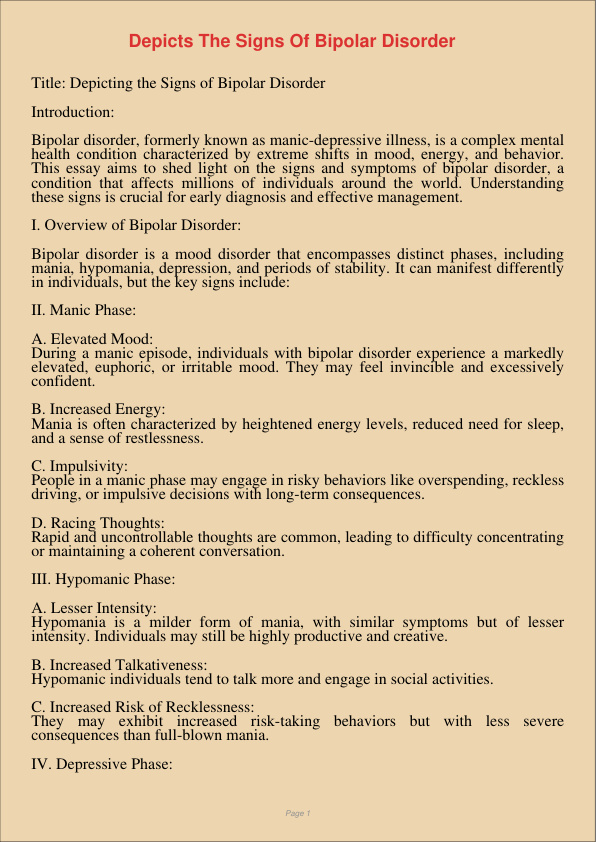Title: Depicting the Signs of Bipolar Disorder
Introduction:
Bipolar disorder, formerly known as manic-depressive illness, is a complex mental health condition characterized by extreme shifts in mood, energy, and behavior. This essay aims to shed light on the signs and symptoms of bipolar disorder, a condition that affects millions of individuals around the world. Understanding these signs is crucial for early diagnosis and effective management.
I. Overview of Bipolar Disorder:
Bipolar disorder is a mood disorder that encompasses distinct phases, including mania, hypomania, depression, and periods of stability. It can manifest differently in individuals, but the key signs include:
II. Manic Phase:
A. Elevated Mood: During a manic episode, individuals with bipolar disorder experience a markedly elevated, euphoric, or irritable mood. They may feel invincible and excessively confident.
B. Increased Energy: Mania is often characterized by heightened energy levels, reduced need for sleep, and a sense of restlessness.
C. Impulsivity: People in a manic phase may engage in risky behaviors like overspending, reckless driving, or impulsive decisions with long-term consequences.
D. Racing Thoughts: Rapid and uncontrollable thoughts are common, leading to difficulty concentrating or maintaining a coherent conversation.
III. Hypomanic Phase:
A. Lesser Intensity: Hypomania is a milder form of mania, with similar symptoms but of lesser intensity. Individuals may still be highly productive and creative.
B. Increased Talkativeness: Hypomanic individuals tend to talk more and engage in social activities.
C. Increased Risk of Recklessness: They may exhibit increased risk-taking behaviors but with less severe consequences than full-blown mania.
IV. Depressive Phase:
A. Persistent Sadness: During depressive episodes, individuals experience prolonged and severe sadness, hopelessness, and a sense of emptiness.
B. Low Energy: Energy levels plummet, leading to fatigue and difficulty initiating tasks.
C. Changes in Sleep and Appetite: Sleep disturbances and changes in appetite are common, often resulting in insomnia or excessive sleep, and weight loss or gain.
D. Suicidal Thoughts: Severe depressive episodes may lead to thoughts of self-harm or suicide.
V. Periods of Stability:
A. Between these mood swings, individuals may experience periods of relative emotional stability, allowing for a semblance of normalcy.
B. Medication and therapy can help stabilize these mood shifts and reduce the frequency and intensity of episodes.
Conclusion:
Bipolar disorder is a complex mental health condition that manifests through alternating periods of mania, hypomania, depression, and stability. Recognizing the signs and symptoms of bipolar disorder is critical for early diagnosis and appropriate treatment. With the right interventions, individuals with bipolar disorder can lead fulfilling lives and effectively manage their condition. Raising awareness about bipolar disorder is essential to reduce stigma and improve the lives of those affected by this condition.

「真诚赞赏,手留余香」
真诚赞赏,手留余香
使用微信扫描二维码完成支付
